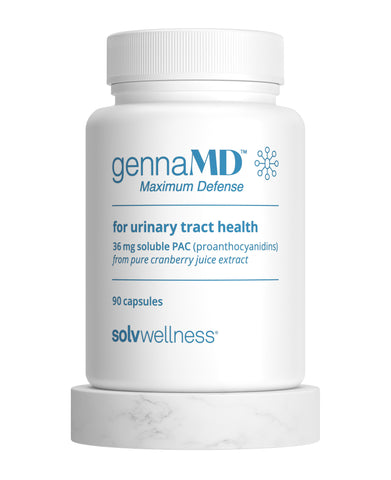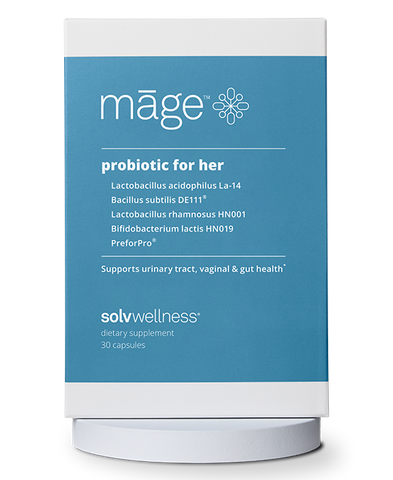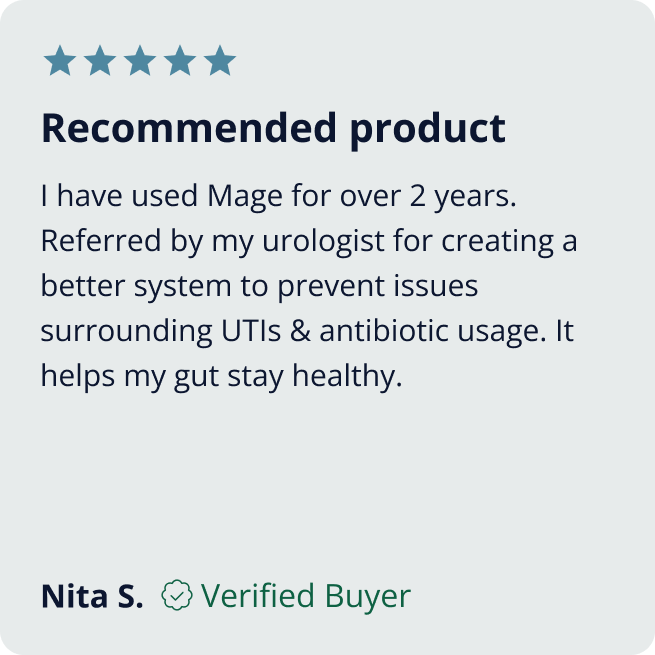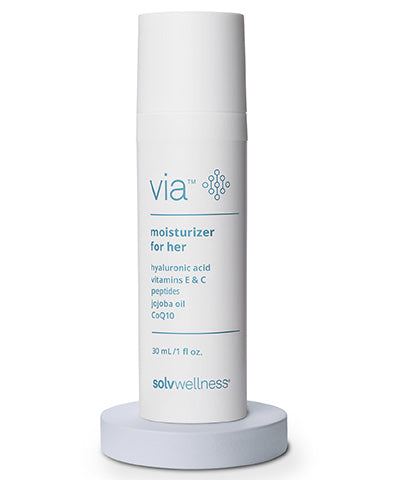Do you have a sudden and frequent urge to use the bathroom? And burning with urination? You may have a UTI. UTIs, short for urinary tract infections, are especially common for women. In fact, approximately 50-60% of women will experience at least one UTI during their lifetime.
Being born with female anatomy makes you more vulnerable to these often painful infections. This is because the female urethra is shorter than the male urethra, allowing bacteria to reach the bladder more easily. Hormonal changes due to menopause or other factors can also increase susceptibility to urinary tract infections.
Besides having to constantly pee, the symptoms of a UTI can include painful or burning sensations. You may also feel pressure in your stomach, pass blood, and/or develop a fever. You could notice cloudy and smelly urine in the porcelain throne. These symptoms aren’t exhaustive, but they are the most common.
Typically, UTI prevention and treatment means antibiotics, but you can develop resistance if you take them too often. We’ll explore more than one alternative to daily, low-dose antibiotics for UTI prevention. Some of these options include UTI supplements, and others involve lifestyle changes.
why seek alternatives to antibiotics?
You might already be aware that antibiotic resistance is on the rise. Antibiotic resistance happens when bacteria change, developing resistance to traditional antibiotic treatments. Your risk of becoming resistant increases each time you use antibiotics.
Individuals who use antibiotics long-term are also at risk. When you become resistant, antibiotics may not be able to get rid of harmful bacteria. This includes bacteria that cause UTIs. You can take the pills, but they just won’t help clear up your infection.
Besides antibiotic resistance, it’s possible to experience side effects, such as increased sensitivity to sunlight and an upset stomach when taking certain medications. Some people are also allergic to antibiotics like penicillin and erythromycin, meaning they have to find alternative treatments.
Of course, antibiotics are the best course of action for an active UTI. However, there are natural and non-antibiotic options for UTI prevention. You can manage your urinary tract health without daily, low-dose antibiotics.
Exploring natural and preventative options can provide a longer-term solution. Here are a handful of supplements to discuss with a medical professional:
at-home prevention methods
Curious about which UTI supplement is best? Let’s look at natural supplements, such as cranberry products, D-mannose, and probiotics.
cranberry products
You may have heard your friends and family talk about how cranberries can help prevent UTIs. However, reaching for a cranberry juice cocktail from your supermarket shelf won’t have much effect. Most of these products come loaded with added sugar, which actually encourages bacteria to grow. There is no evidence that juice cocktails with added sugars work.
Juice cocktails don’t contain 100% juice, and you’re not getting the benefits that come from pure juice extracts, which have proanthocyanidins. Instead, you want a cranberry supplement with a high concentration of proanthocyanidins (PAC).
Some studies show that PAC from pure cranberry juice can help manage UTIs by preventing bacteria from sticking to the walls of the bladder. Think of it like using a nonstick spray on a pan; the PAC creates a slippery surface that makes it harder for bacteria to latch on and stay put. By reducing the bacteria’s ability to adhere, PAC helps prevent infections from taking hold in the bladder.
GennaMD is a supplement made from PAC. Its effectiveness is clinically proven and it stops UTI-causing bacteria from sticking to your bladder. It’s also a good option for those who prefer a supplement over drinking large quantities of cranberry juice, which may not provide the same level of PAC.
d-mannose
D-mannose is a compound related to glucose, and it’s taken as a pill or consumed by eating fruits like oranges. While D-mannose has been thought to bind to bacteria to prevent UTIs, recent studies show inconsistent results. In multiple cases, D-mannose did not result in a significant reduction in recurrent UTIs, as demonstrated in a recent JAMA study.
Although the studies observed some anti-adhesion activity with Type 1 E. coli bacteria, the results were inconsistent. The bottom line is recent studies have been unable to substantiate D-mannose as an effective UTI supplement for prevention. As the JAMA study’s results showed, PAC is more effective if you want to prevent UTIs.
probiotics
Probiotics can help your body maintain the right balance between good and bad bacteria. You’ve likely heard probiotics touted as a natural aid for digestive issues, including irritable bowel syndrome.
Specific strains, such as lactobacillus, can support urinary tract health. These strains may prevent recurrent UTIs by restoring a healthy balance of bacteria. A study from Harvard and Washington Universities showed women with recurring UTIs had different gut microbiomes. These individuals tended to have less diversity in healthy gut microbiota compared to women without recurrent UTIs. In other words, they didn’t have as many good bacteria strains to negate the harmful strains. Some studies have also shown lactobacilli strains in foods like yogurt protect the bladder, preventing repeat UTIs.
Taking probiotics helps restore the balance between good and bad bacteria. Because probiotics are living organisms, you want to look for options with high survival rates. Also, look for supplements designed for women and those that include prebiotics.
Prebiotics set the stage for probiotics to do their job well. With prebiotics, probiotics can grow and survive in your body better.
lifestyle and dietary changes
Making changes to your lifestyle and diet can help prevent urinary tract infections. Examples include drinking enough water every day. You can also reach out to healthcare professionals for guidance when you’re in doubt.
hydration
Dehydration is a major risk factor for UTIs because it creates an unhealthy environment in the bladder. When you don’t drink enough fluids, your bladder can become irritated, which may lead to UTIs and even kidney issues.
At the same time, staying well-hydrated helps maintain a healthy bladder by aiding in the regular flushing out of bacteria and toxins. By drinking plenty of water, you increase the frequency of urination, which in turn helps expel harmful bacteria and toxins from your body.
Water, of course, is the ideal beverage for staying hydrated. Most adult women should try to get at least 11.5 cups of fluid every day. This number increases if you exercise, work outdoors, or are exposed to high humidity or temperature levels.
diet
Certain foods may help prevent UTIs by boosting your immune system and keeping you hydrated. For instance, foods with high amounts of vitamin C may support your immune system. It’s why you’ve heard you should drink orange juice when you’re sick.
Meanwhile, fruits and veggies boost your fluid intake. Stronger immunity and good hydration mean your system can fight harmful bacteria, including strains that cause UTIs. Overall, you want to strive for a balanced diet to maintain urinary health.
Likewise, you can avoid or limit foods with the power to weaken your immune system. Alcohol and foods and beverages high in caffeine are examples. Both alcohol and caffeine can dehydrate you, promoting bladder irritation.
consulting a healthcare provider
Before you start any alternative prevention for UTIs, seek guidance from your doctor or medical practitioner. Starting a UTI supplement on your own isn’t often recommended because supplements can interact with other medications.
Antibiotics are meant to get rid of UTI-causing bacteria and remain the gold standard for treatment if you have an active UTI.
Alternative treatments can help support antibiotics for current UTIs and help you get ahead of future infections. Medical professionals can monitor and determine the effectiveness of various alternatives for UTIs. If something isn’t working, they can steer you toward a better treatment option.
conclusion
When seeking an alternative to daily, low-dose antibiotics for UTIs, it’s important to consider effectiveness and safety. A urinary tract supplement with PAC has been shown to fight UTI-causing bacteria better than D-mannose. Probiotics and lifestyle changes such as drinking enough water and eating vitamin C–rich foods also help.
Nonetheless, personalized care and consultations with healthcare providers are paramount to UTI prevention and treatment. Ask your doctor about a holistic approach. Combining natural and conventional methods can attack the problem from multiple angles.
FAQ
what can I take for a UTI instead of antibiotics?
If you have an active UTI, doctors agree that antibiotics are the best and only course of action.
If you’re looking for alternatives to low-dose antibiotics for preventing a UTI, there are several natural options and lifestyle changes that may help. One popular supplement is pure cranberry juice extract, which contains proanthocyanidins (PAC) that can prevent bacteria from attaching to the bladder walls, potentially reducing the risk of recurring infections. Probiotics, particularly those containing lactobacillus strains, may also support urinary tract health by maintaining a healthy balance of bacteria in your gut and urinary system.
In addition to supplements, staying hydrated is crucial. Drinking plenty of water helps flush out bacteria from your urinary tract, which can prevent infections. You might also consider adding vitamin C–rich foods to your diet, as a strong immune system can help fight off harmful bacteria.
It’s essential to consult with a healthcare provider before starting any alternative prevention methods. They can guide you on the best approach, especially if you have underlying health conditions or are taking other medications. While these alternatives can support urinary tract health and help you get ahead of future UTIs, antibiotics are still the primary treatment for active infections.







